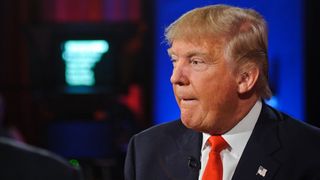Trump Makes It Official: FCC Privacy Rules Are History

The FCC's broadband privacy rules are officially gone.
President Donald Trump late Monday signed H.J. Res. 34, the Congressional Review act resolution nullifying the Oct. 27 party-line vote under former FCC chairman Tom Wheeler to adopt the rules, which would have required ISPs to get their subs' permission to collect and share web use, app use and geolocation information with third parties and would have imposed data security and breach reporting requirements.
The House narrowly passed resolution last week generally along party lines, following Senate passage (also a squeaker), the week before in a purely partisan vote.
In announcing the signing, the White House said it was nullifying "the Federal Communications Commission’s rule on privacy of customers of broadband and other telecommunications services."
It was not immediately clear what other telecommunications services the Administration was referring to. The FCC order actually comprises a number of rules that apply to Internet access providers.
Trump's signature was hardly a surprise. White House press secretary Sean Spicer signaled last week the rules were just the sort of regulatory overreach the President wanted to dial back.
“President Trump and Congress have appropriately invalidated one part of the Obama-era plan for regulating the Internet," said FCC chairman Ajit Pai, who had already stayed enforcement of some of the rules and dissented from their adoption back in October. "Those flawed privacy rules, which never went into effect, were designed to benefit one group of favored companies, not online consumers."
Broadcasting & Cable Newsletter
The smarter way to stay on top of broadcasting and cable industry. Sign up below
An FCC source on background said that at least one of the rules, prevented ISPs from making info sharing a quid pro quo for Internet access service had gone into effect, but the opt-in portion were not scheduled to kick in until the end of this year, and the FCC had stayed the data security portion, scheduled to take effect last month.
"American consumers’ privacy deserves to be protected regardless of who handles their personal information. In order to deliver that consistent and comprehensive protection, the Federal Communications Commission will be working with the Federal Trade Commission to restore the FTC’s authority to police Internet service providers’ privacy practices. We need to put America’s most experienced and expert privacy cop back on the beat. And we need to end the uncertainty and confusion that was created in 2015 when the FCC intruded in this space.”
Either the FCC or Congress will need to reverse the FCC's classification of internet as a common carrier to restore the FTC's authority, or Congress could eliminate the FTC's common carrier exemption.
“I applaud President Trump and Congress for utilizing the CRA to undo the FCC’s detrimental privacy rules," said FCC commissioner Michael O'Rielly, who also dissented from the rules. "The parade of horribles trotted out to scare the American people about its passage are completely fictitious, especially since parts of the rules never even went into effect. Hopefully, we will soon return to a universe where thoughtful privacy protections are not overrun by shameful FCC power grabs and blatant misrepresentations.”
Democratic commissioner Mignon Clyburn, who voted for the rules, took a last-second shot at preserving them in an op ed with FTC commissioner Terrell McSweeny.
Contributing editor John Eggerton has been an editor and/or writer on media regulation, legislation and policy for over four decades, including covering the FCC, FTC, Congress, the major media trade associations, and the federal courts. In addition to Multichannel News and Broadcasting + Cable, his work has appeared in Radio World, TV Technology, TV Fax, This Week in Consumer Electronics, Variety and the Encyclopedia Britannica.

